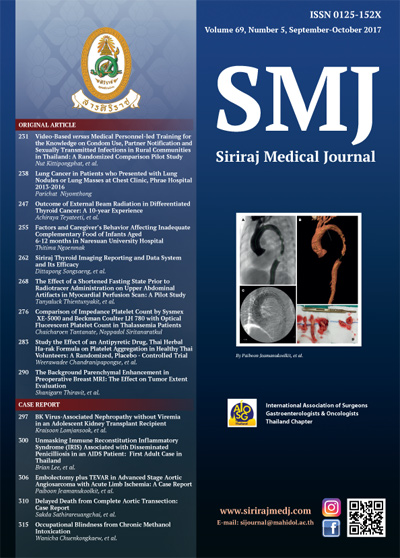BK Virus-Associated Nephropathy without Viremia in an Adolescent Kidney Transplant Recipient
Keywords:
BKVAN, BK viremia, BK viruria, kidney transplantationAbstract
BK virus can reactivate in kidney transplant recipients leading to BK virus-associated nephropathy (BKVAN) and allograft dysfunction. Pathogenesis begins with viral replication, follows by viruria, viremia and nephropathy. Screening tools recommended for viral detection are urine and blood BK viral load. Viremia has higher positive predictive value than viruria, thus several guidelines recommend using viremia to determine whether renal biopsy, a gold standard for diagnosis of BKVAN is needed. We present a 16-year-old boy who developed BKVAN five months after deceased donor kidney transplantation. He had increased serum creatinine with negative blood BK viral load. BK nephropathy was diagnosed in kidney graft biopsy. The urine showed BK viruria. Immunosuppressant
was reduced and ciprofloxacin given. Viruria disappeared and repeated graft biopsy was normal 4 months later. BK viremia was negative through 1 year follow up.
We conclude that BKVAN may occur even without viremia and BK viruria may be considered for screening
tool.
Downloads
Published
How to Cite
Issue
Section
License
Authors who publish with this journal agree to the following conditions:
Copyright Transfer
In submitting a manuscript, the authors acknowledge that the work will become the copyrighted property of Siriraj Medical Journal upon publication.
License
Articles are licensed under a Creative Commons Attribution-NonCommercial-NoDerivatives 4.0 International License (CC BY-NC-ND 4.0). This license allows for the sharing of the work for non-commercial purposes with proper attribution to the authors and the journal. However, it does not permit modifications or the creation of derivative works.
Sharing and Access
Authors are encouraged to share their article on their personal or institutional websites and through other non-commercial platforms. Doing so can increase readership and citations.











